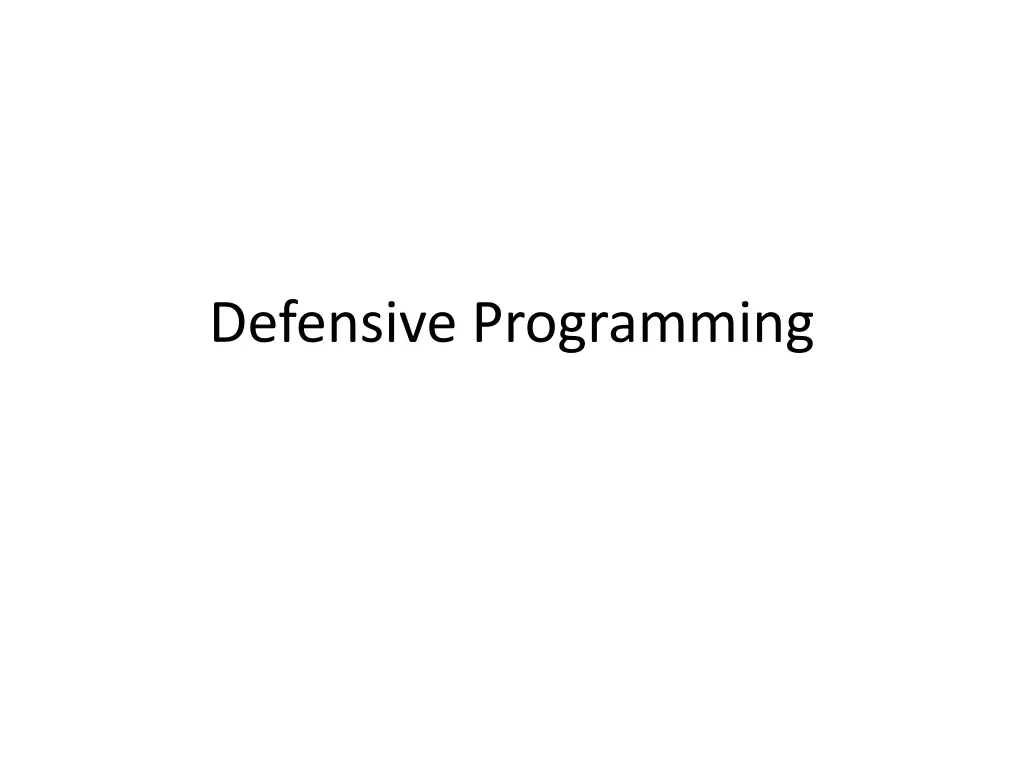
Effective Defensive Programming Techniques
"Learn how defensive programming helps prevent coding mistakes and enhances program reliability. Explore the importance of assertions in making assumptions explicit and detecting errors early on. Discover how to enable assertions in Java for bug-free software."
Download Presentation

Please find below an Image/Link to download the presentation.
The content on the website is provided AS IS for your information and personal use only. It may not be sold, licensed, or shared on other websites without obtaining consent from the author. If you encounter any issues during the download, it is possible that the publisher has removed the file from their server.
You are allowed to download the files provided on this website for personal or commercial use, subject to the condition that they are used lawfully. All files are the property of their respective owners.
The content on the website is provided AS IS for your information and personal use only. It may not be sold, licensed, or shared on other websites without obtaining consent from the author.
E N D
Presentation Transcript
Defensive Programming Good programming practices that protect you from your own programming mistakes, as well as those of others Assertions Parameter Checking
Assertions As we program, we make many assumptions about the state of the program at each point in the code A variable's value is in a particular range A file exists, is writable, is open, etc. Some data is sorted A network connection to another machine was successfully opened The correctness of our program depends on the validity of our assumptions Faulty assumptions result in buggy, unreliable code
Assertions int binarySearch(int[] data, int searchValue) { // What assumptions are we making about the parameter values? } data != null data is sorted What happens if these assumptions are wrong?
Assertions Assertions give us a way to make our assumptions explicit in the code assert temperature > 32 && temperature < 212; The parameter to assert is a boolean condition that should be true assert condition; If the condition is false, Java throws an AssertionError, which crashes the program Stack trace tells you where the failed assertion is in the code
Assertions int binarySearch(int[] data, int searchValue) { assert data != null; assert isSorted(data); } String[] someMethod(int y, int z) { assert z != 0; int x = y / z; assert x > 0 && x < 1024; return new String[x]; }
Assertions Assertions are little test cases sprinkled throughout your code that alert you when one of your assumptions is wrong This is a powerful tool for avoiding and finding bugs Assertions are usually disabled in released software In Java, assertions are DISABLED by default To turn enable them, run the program with the enableassertions (or -ea) option java enableassertions MyApp java ea MyApp In Eclipse, the enableassertions option can be specified in the VM arguments section of the Run Configuration dialog
Assertions Alternate form of assert assert condition : expression; If condition is false, expression is passed to the constructor of the thrown AssertionError int binarySearch(int[] data, int searchValue) { assert data != null : binary search data is null ; assert isSorted(data) : binary search data is not sorted ; } String[] someMethod(int y, int z) { assert z != 0 : invalid z value ; int x = y / z; assert x > 0 && x < 1024 : x; return new String[x]; }
Assertions If one of my assumptions is wrong, shouldn't I throw an exception? No. You should fix the bug, not throw an exception.
Parameter Checking Another important defensive programming technique is "parameter checking" A method or function should always check its input parameters to ensure that they are valid If they are invalid, it should indicate that an error has occurred rather than proceeding This prevents errors from propagating through the code before they are detected By detecting the error close to the place in the code where it originally occurred, debugging is greatly simplified
Parameter Checking Two ways to check parameter values assertions if statement that throws exception if parameter is invalid int binarySearch(int[] data, int searchValue) { assert data != null; assert isSorted(data); } int binarySearch(int[] data, int searchValue) { if (data == null || !isSorted(data)) { throw new InvalidArgumentException(); } }
Parameter Checking Should I use assertions or if/throw to check parameters? If you have control over the calling code, use assertions If parameter is invalid, you can fix the calling code If you don't have control over the calling code, throw exceptions e.g., your product might be a class library that is called by code you don t control
